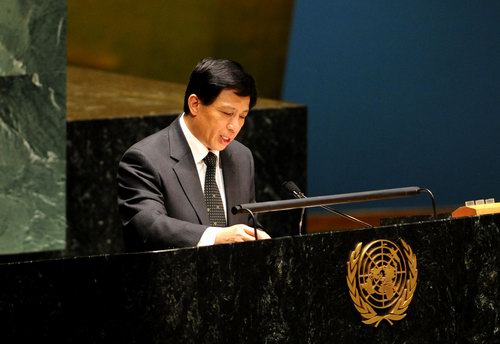| Statement by Ambassador Zhang Yesui at the Plenary Meeting of the 64th Session of the General Assembly on Item 45: Sport for Peace and Development |
| 2009-10-19 16:08 |
|
New York, 19 October 2009 Mr. President, China supports the consideration of the agenda item "Sport for Peace and Development" in the plenary meeting of the General Assembly. China believes that sport has always played a major catalytic role in mankind's pursuit of peace and development. It deepens understanding and exchanges among different cultures and promotes dialogue and cooperation. China appreciates efforts by the UN to integrate the values of sport with the goal of peace and development. We support the Secretary General's special advisor and the UN Sport Office in their endeavor to mobilize all resources to incorporate sport into activities and programs for peacekeeping, development, education, health, gender equality, and the safeguarding of the rights and interests of persons with disabilities, so as to further advance the role of sport in helping to achieve the UN MDGs. Last year, the Chinese government successfully hosted the 29th Summer Olympic Games and the 13th Paralympic Games in Beijing. Two years ago, Chinese delegation sponsored and tabled for adoption an Olympic Truce resolution at the 62nd Session of the General Assembly. Today, we are pleased to see that, under the item of sport, the governments of Canada and South Africa have tabled draft resolutions on Olympic Truce and FIFA World Cup respectively. China is willing to join the co-sponsors of the two resolutions, and we wish the 2010 Vancouver Winter Olympic and Paralymic Games, FIFA World Cup in South Africa, and the first Youth Olympic Games in Singapore a complete success! We also welcome the participation of International Olympics Committee in the General Assembly as an observer.
(Photographer: Mr. SHEN Hong, Xinhua) Mr. President, The success of the Beijing Olympics has greatly increased the impact of Olympic Games in developing countries, promoted the spread of the Olympic spirit, aroused the enthusiasm of hundreds of millions of Chinese people in sport and solidified the social foundation of the development of sport at the grass roots level in China. In January 2009, in order to carry on the invaluable spiritual heritage of the Beijing Olympics and advance our national fitness program, the Chinese government proclaimed August 8, the opening day of the Beijing Olympic Games, as National Fitness Day. In September of this year, the Chinese government promulgated National Fitness Regulations, the first comprehensive set of administrative regulations focusing on the development of the national fitness program. By specifying the right of citizens to engaging in national fitness activities and the responsibilities of government departments in promoting fitness for all, the Regulations provide strong legal protection for national fitness activities. The Chinese government has also put in place a national physical condition monitoring system, a set of physical exercise standards, and a physical training system for the general public. Concerted efforts and assiduous exploration have led to good results in utilizing the Beijing Olympic Games stadiums, thus reaping social as well as economic benefits. Facts have proven that the people of China are capable not only of hosting a "truly exceptional" Olympic games, but also of wisely managing the invaluable physical heritage as well as passing on the spiritual heritage of the Beijing Olympic Games. Mr. President, 2009 marks the 60th anniversary of the founding of the new China. The past 60 years have witnessed rapid progress in our economic and social development and spectacular achievements in sport. The advancement of sport in China has greatly promoted public health, enhanced the self-confidence of the Chinese people and inspired us in our ceaseless pursuit of excellence. Sport has become a booster of progress in all fields. Currently, with the coordination and healthy development of competitive sport, grass-roots sport activities, and physical education throughout the Chinese educational system, the number of people engaged in regular physical exercise accounts for 28.2% of the entire population. There are more than 850,000 sports facilities nationwide and 1.03 square meters of sports facilities per capita, which are, respectively, 200 times and 100 times more than the amount of what we had at the founding of the People's Republic of China. The organization of sport activities at the grass roots level have been consistently improving in a systematic and scientific way. The standardized management of sports events and their appeal to the public have also been on the rise. There are now, throughout the country, nearly 210,000 urban and rural fitness training centers and fitness venues, 3,092 youth sport clubs. The number of national single-event sport associations, provincial, district and municipal sport associations, and professional sports associations has increased to 176. Guided by the scientific outlook on development, the Chinese government will continue to give full play to the positive role of sport in the building of a harmonious society, adhere to the goal of raising the physical well-being and quality of life of the entire Chinese people, build more and better urban and rural fitness facilities, improve grass-roots sport organizations and the national fitness system, and provide better sport service to the public, so that the people can share health and development outcomes brought by sport. We stand ready to work with other countries and continue to advance the role of sport in promoting international peace and development, enhance international cooperation and exchanges in sport, and jointly contribute to world peace, development and prosperity. Thank you, Mr. President.
|
| |||||||||||||
| |||||||||||||
